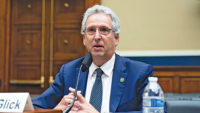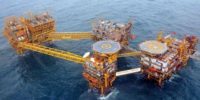In what company insiders and observers say was unexpected, Fluor Corp. CEO David Seaton resigned on May 1 and left the company board of directors, just before the firm’s release of first-quarter results that included a $58-million loss, compared with an $18-million loss for the same period a year ago.
Three-month revenue for the firm, traded on the New York Stock Exchange, fell 13% to $4.19 billion, below analysts’ expectation of $4.81 billion, with all of Fluor's corporate segments also missing consensus expectations on revenue, said UBS construction sector analyst Steven Fisher.
The company last month also did not win re-award of a lucrative LOGCAP military construction and logistics support contract in Afghanistan but one Wall St. analyst says it is "best positioned to win its fair share" of [upcoming] LNG and petrochemical work.
The company last month also was not chosen as repeat contractor for a lucrative LOGCAP military construction and logistics support contract in Afghanistan, although it was re-selected to support DOD and other agencies in Africa.
The firm filed a bid protest with the U.S. Government Accountability Office (GAO) on May 1 related to award outcome, with a decision expected in August.
Shares fell 28% early on May 2 to $29.60, the biggest decline since at least December 2000, before recovering, according to Bloomberg. Fluor lowered its 2019 earnings outlook by $1 per share.
With charges taken on several problem energy projects not identified, Fluor's board named former CEO Alan Boeckmann, 70, as executive chairman. He joined Fluor in 1974, served as CEO from 2002 to 2011 and retired in 2012 but returned to its board last year.

"I'm betting on Boeckmann," says one industry executive, noting the former CEO's earlier push to diversify the firm from its one-time energy-only focus. "Alan’s strengths are just what the firm needs now. He has respect in all quarters."
Boeckmann is a board director of BP, Sempra Energy and Archer Daniels Midland, but is leaving the BP board this month, Fluor said.
The firm also reported $4.3 billion in new contract awards, including $1 billion of energy work.
Lead construction sector analyst Jamie Cook of Credit Suisse noted that LNG projects may move forward, pointing to developments at planned facilities in Port Arthur, Texas and Lake Charles, La.
The contractor "still has the cycle in its favor as best positioned to win its fair share of LNG and petrochemical work this cycle," she said in a May 6 update, noting an opportunity for Fluor under new leadership "to improve risk management processes and controls and potentially emerge as a self-help story. "
Andrew Wittmann, construction sector analyst for Baird Equity Research, said in a May 2 research note that "Fluor's good balance sheet is proving to be a valuable asset, yet there is a long road ahead."
Seaton, 57, is a 34-year Fluor veteran who had been CEO since 2011. Stepping down now “was not what he wanted,” according to one industry executive. Sources expect Boeckmann to stay for one year.
Veteran Exec Named CEO
Named as Fluor interim CEO is its chief legal officer Carlos Hernandez, who joined the firm in 2007.
Boeckmann told analysts on May 2, according to a Yahoo Finance transcript, that Hernandez, also a civil engineer, has become "extensively involved in operations" and has been given “full authority to go forward” as CEO. He said: "we are not doing a [new CEO] search."
He said Hernandez will be expected to "drive dramatic improvement in risk assessment, bidding processes and project execution."
Hernandez said that while "97+%" of Fluor's projects are "performing very well. ... We have just a couple of projects that have been challenging for us for a variety of reasons." He said Fluor has "dedicated special resources" to the unidentified gas-fired power plants and an offshore project that are reportedly at issue.
Hernandez told analysts that the power plant projects at issue "will be behind us by early summer," although "ongoing issues with our client will probably linger for awhile. Hopefully we can resolve those on a commercial basis."
But Hernandez acknowledged, citing a competitive environment, that "we probably were more aggressive than we should have been in bidding those projects."
On the offshore project, Hernandez noted changed engineering requirements that "surprised" Fluor and the owner, and generated "extra costs and delays." He told analysts that on the project, a floating production storage and offloading facility (FPSO) that was reported last quarter to be close to 50% complete, the firm is "working closely with our fabricator" and "we're on the right path ... to deliver a project" to a client that "is in the process of providing additional financial support."
Looking Forward
One industry executive with knowledge of Fluor predicts only a 30% chance that Hernandez or another insider, possibly Rick Koumouris, president of its mining & metals, infrastructure, power, life sciences & advanced manufacturing group, could be considered to fill the role permanently.
Others say Boeckmann could appoint a chief operating officer, a role not filled since Peter Oosterveer left Fluor in 2017 after three years as COO to become CEO of Netherlands design giant Arcadis.

Some in industry speculate whether Fluor could become a takeover target by a U.S. player, with Jacobs and Bechtel mentioned. With the contractor's lowered market cap, "there are more potential buyers," says one close observer.
Notes an executive of a rival firm in the infrastructure sector, "They have some things to clean up but with the reduced stock price anything is possible. They have a huge backlog but I'm not not sure how stable it is; they have taken some really cheap work."
Hernandez told analysts that "we have to be rational about the amount of risk that a contractor can take. We're going to bring back in our relationships with our clients to try to balance that risk appropriately."
Analysts are cautious. “Fluor will find management footing, but it’s not apparent yet,” said Baird's Wittmann. "A leader and a strategy are key elements needed to stabilize things."






Post a comment to this article
Report Abusive Comment